When you go to a car museum, you’re taken through the journey of time, starting from Karl Benz’s 1886 gasoline-powered automobile with a top speed of about 10 mph, through the 20th century revolution powered by Henry Ford reaching 45mph. And when you exit the building, you get into your computerized machines with advanced safety features, entertainment systems, and GPS capable of reaching blistering speeds of up to 200mph.
The evolution of legal technology is a similar journey.
Starting from a fountain pen and a notepad, we’ve seen dictation machines, typewriters, fax machines, and bulky computers. Each innovation nudged the profession forward, incrementally shaping how legal work gets done.
Today, we find ourselves at the dawn of another transformation—
Artificial intelligence is quickly becoming an integral part of the modern legal toolkit, offering capabilities far beyond what even the most visionary lawyers of past decades could have imagined.
So, it’s time to get out of the museum and embrace the new technologies. Let’s learn how to make the most out of them.
Automate your customer requests with AI
Is there AI for lawyers that is safe to use?
Yes, there are numerous AI tools specifically designed for lawyers, and AI adoption in the legal profession has grown dramatically. In fact, AI adoption in law firms skyrocketed from 19% in 2023 to 79% in 2024. But you need to be careful, so let’s go through some of the main concerns of lawyers using AI.
Quality of output
AI tools can produce convincing but incorrect information, a phenomenon known as hallucination. This is particularly dangerous in legal work where accuracy is crucial. The ABA’s 2024 guidance and AI laws emphasize that lawyers must maintain competency when using AI, which includes understanding the tool’s limitations.
On top of that, AI systems can perpetuate or amplify existing biases present in their training data. In legal contexts, this could manifest as:
- Discriminatory outcomes in strategy recommendations or case analysis
- Biased interpretation of legal precedents
- Unequal treatment suggestions based on protected characteristics
- Historical legal biases being reinforced rather than corrected
To mitigate the risks, you should always verify AI-generated legal research and citations independently. Moreover, you can cross-reference AI recommendations with multiple sources and maintain human oversight for all substantive legal judgments. And, just to be safe, you should be particularly cautious with AI advice on sensitive areas like criminal law, discrimination cases, or constitutional issues.
Data security
AI use raises complex ethical questions that implicate principles of confidentiality. Key concerns include:
- Third-party data handling: client information shared with AI tools may be stored, processed, or used for training by AI companies
- Security vulnerabilities: inadequate encryption or security measures of the AI provider
To be on the safe side, you should use AI tools with strong privacy policies and data protection guarantees, so consider using enterprise-grade AI services with enhanced security features.
Also, implement clear data governance policies for AI use in your practice. And, most importantly, avoid inputting highly sensitive client information into general AI tools.
Read more: Use the responsible AI customer service checklist to see if your AI is ethical and compliant with regulatory requirements.
Ethics of use
Florida bar ethics opinion from 2024 advises lawyers to review AI work products similarly to how they would review a paralegal’s work. The key ethical obligations you should implement are:
- Competence: get to know the AI tools you’re using well enough to supervise the outcome produced
- Informed consent: disclosure to your clients when and how AI tools are used in their representation
- Supervision and accountability: you must maintain the same standard of care regardless of AI involvement
- Fee and billing ethics: ensure clients receive fair value for legal services
Some of the best practices you should follow include developing written policies for AI use, regularly updating these policies, and providing training for all staff who use AI tools. Also, you should maintain detailed records of how AI was used in client matters and stay current with state bar guidance on AI ethics. And, if you can, consider obtaining malpractice insurance that covers AI-related claims.
The legal profession is still developing comprehensive frameworks for AI use. So, stay informed about ethical guidance and maintain a conservative approach to sensitive matters. At the end of the day, AI can help you boost productivity and save time. But you need to use the technology responsibly.
How can you use AI tools for lawyers?
With proper training, AI can help lawyers review contracts and search data more accurately and much faster than humans. It also enables handling higher workloads efficiently. Here are the main use cases for AI in law firms:
Research
AI is making legal research faster and more comprehensive than traditional methods. It enhances the practice with:
- Case law and statute analysis: allows lawyers to ask questions and receive well-researched answers supported by relevant case law and statutes
- Cross-jurisdictional research: automates drafting and builds arguments that compare points of law from multiple jurisdictions
- Speed and efficiency: finds relevant case law, statutes, and regulations quickly, cutting down the time spent on legal research
AI tools enhance research and efficiency to help lawyers find similar cases and precedents across various jurisdictions. This makes comparative legal analysis faster and more thorough. The AI tools for lawyers also assist in identifying relevant statutes and regulations, especially in intricate legal matters. Additionally, these systems can analyze how courts have interpreted specific legal concepts, enabling practitioners to build strong, well-supported arguments based on comprehensive case law research.
However, while these applications are impressive, there are important limitations to consider. AI systems may struggle with nuanced legal distinctions that could lead to oversights in interpretation. Moreover, verifying citations remains crucial, as AI can occasionally produce inaccurate or nonexistent references. These limitations highlight the importance of using AI as a complement, not a replacement, for expert legal judgment.
Communication with potential clients
AI is increasingly being used to improve client intake processes and initial communications. AI-powered chatbots can handle initial client inquiries, collect basic case information, and schedule appointments. This allows law firms to provide 24/7 responsiveness and make consultations more efficient.
AI-powered tools, like Lyro, can significantly streamline client interactions and improve clarity. You can use them to draft initial response emails to potential clients or translate complex legal procedures into plain language to help clients better understand their situations. Additionally, AI can assist in generating follow-up messages to update clients on the status of their cases or provide recommended next steps.
To maximize the benefits of AI while minimizing risks, certain best practices should be followed. AI should primarily be used for administrative and procedural support, not for offering substantive legal advice. Any AI-generated communication should include clear disclaimers about the limitations of the technology to avoid potential misunderstandings. It’s essential that a human attorney reviews all client-facing content to ensure accuracy and appropriateness. Lastly, it’s essential to uphold strict data security standards when processing any client information through AI systems, safeguarding privacy and maintaining professional ethical obligations.
Summaries of documents
This is one of the most practical and widely adopted AI applications in legal practice that offers significant time savings and improved case preparation.
AI speeds up contract analysis by identifying risks, missing clauses, and inconsistencies. A contract that once demanded hours of line-by-line scrutiny can be triaged and summarized in minutes, though lawyers retain control over final judgment.
AI also creates concise overviews of lengthy documents, allowing lawyers to prioritize their review effectively. This is particularly valuable for court filings and motions from opposing counsel, as well as in regulatory compliance documents.
On top of that, generative AI analyzes patterns in existing documents to create initial drafts. These include pleadings or statements of facts to help lawyers identify the most relevant information to include in their legal arguments.
Legal professionals should provide disclaimers or legal notices clarifying that the summaries are generated by AI and should be reviewed by legal professionals. AI summaries should not be used as a substitute for professional legal advice or a thorough reading of the original document.
Each of these use cases demonstrates AI’s potential to enhance legal practice efficiency. But remember that AI is a powerful tool to augment human legal expertise, and professional oversight is still a necessary practice.
Best AI for lawyers
From contract analysis and legal research to case prediction and document automation, AI-powered tools are helping lawyers focus on high-value tasks. But with so many solutions on the market, it can be hard to know which ones are worth your time and trust. So, we did the work for you.
The best AI tools for lawyers are:
| Tool | Rating | Free plan | Best for |
| Tidio | 4.7/5 ⭐️ | ✅ | Customer service |
| Darrow | N/A | ❌ | Risk assessment |
| Clio | 4.6/5 ⭐️ | ❌ | Document summaries |
| Harvey | 4.5/5 ⭐️ | ❌ | Analysis and recommendations |
| Lexis+ AI | 4.1/5 ⭐️ | ❌ | Legal research |
Tidio’s Lyro
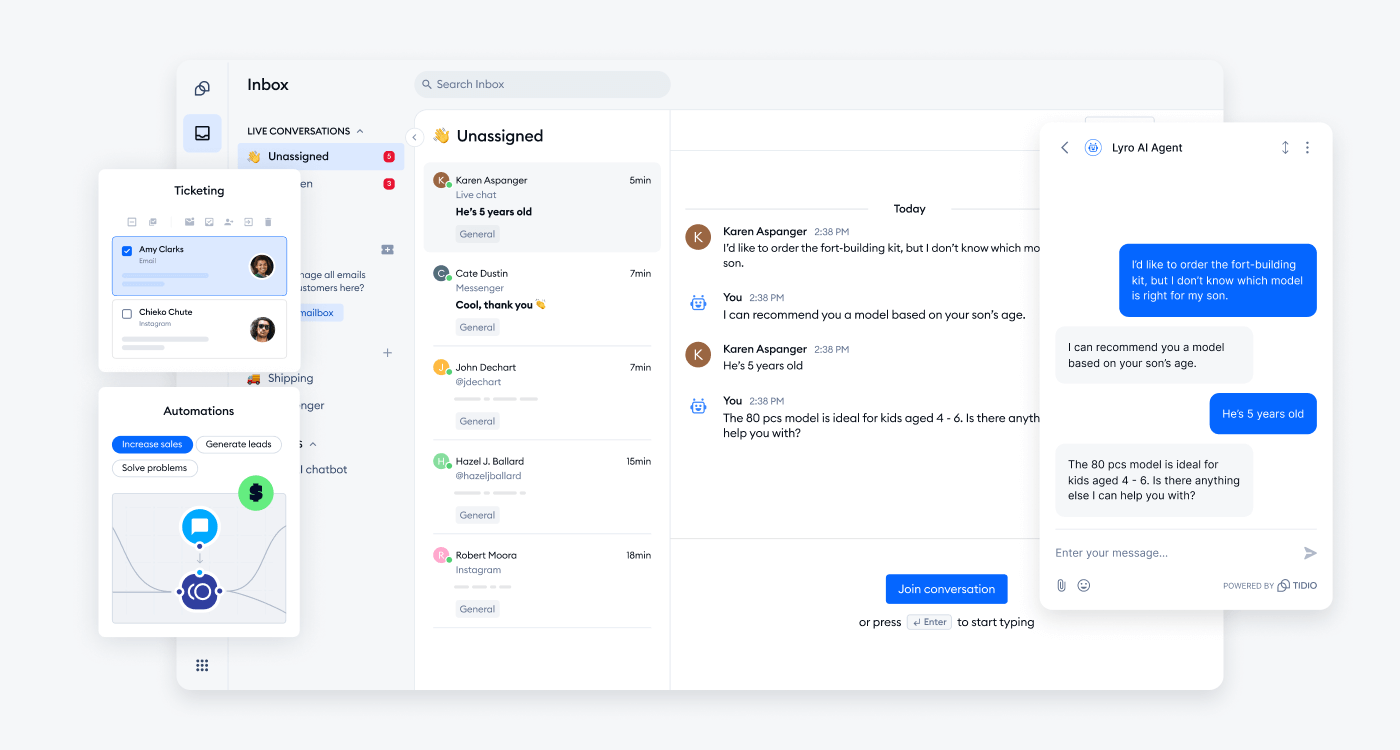
Rating: 4.7/5⭐️ (1,750+ reviews)
Lyro is an AI customer service chatbot built to streamline client communication for law firms and solo practitioners. This conversational AI can handle routine legal inquiries to save time and improve client satisfaction with your firm.
Lyro can be trained on your firm’s knowledge base, including your FAQs, intake forms, or procedural guides. This way, you ensure that it responds to potential clients just as your paralegal or receptionist would. From explaining practice areas to screening leads and scheduling consultations, Lyro provides 24/7 support without ever missing a detail.
Main features:
- Automated ticket triaging
- Variety of chat triggers
- Smooth handoff to human agent
- AI for email replies
- AI and NLP chatbots
Pricing:
- 7-day free trial available
- Free version available
- Starter ($24.17/mo)
- Growth (starts at $49.17/mo)
- Plus (starts at $749/mo)
- Premium (starts at $2999/mo)
Specializes in: Lyro is an AI customer support software that can help legal firms, but keep in mind that it’s not specifically built for lawyers.
Automate customer communications at your law firm
Darrow
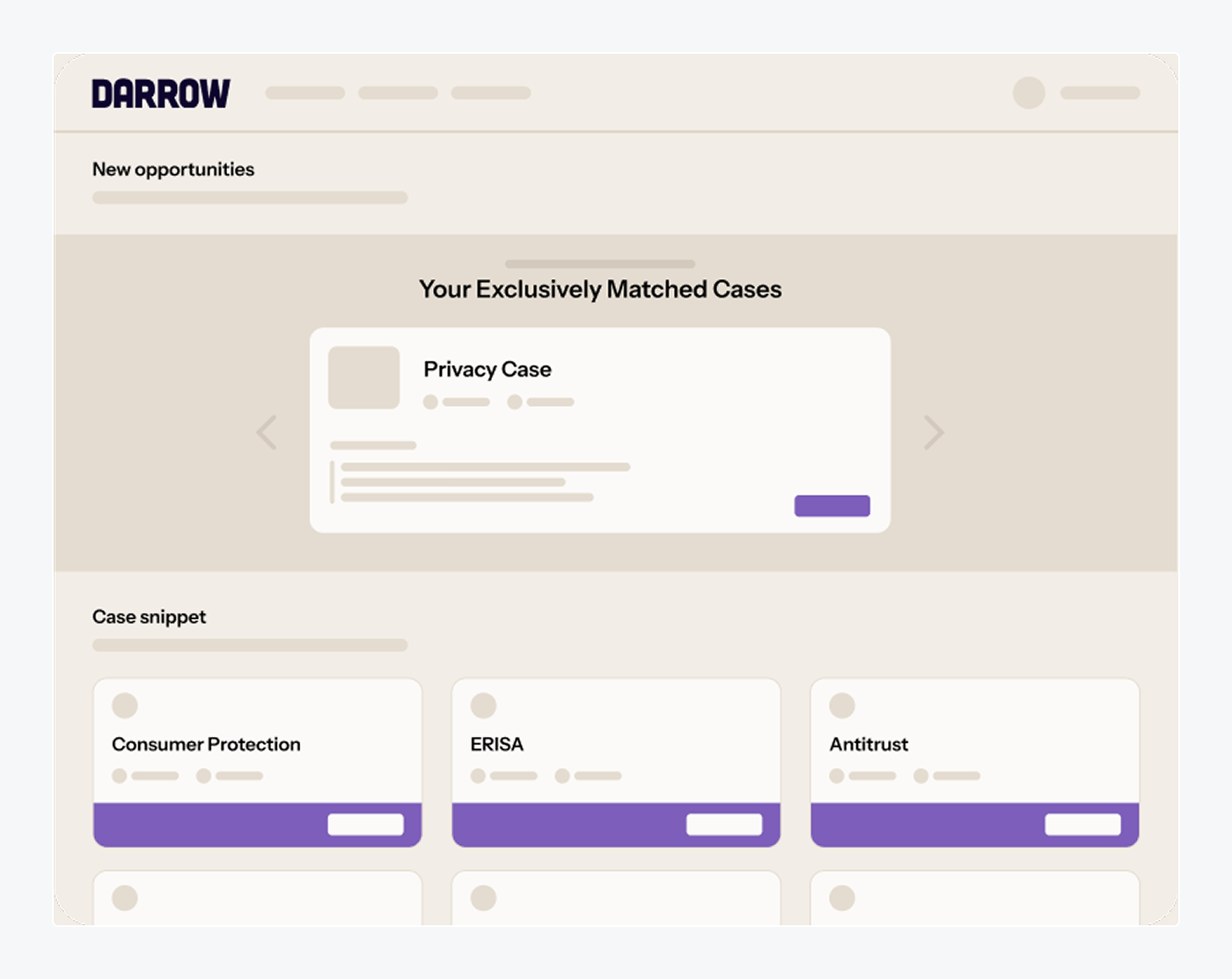
Rating: N/A
Darrow is an AI-powered legal intelligence platform designed to help legal teams proactively discover and assess emerging legal risks. With advanced data analytics, Darrow enables attorneys to identify high-value litigation opportunities and develop data-driven legal strategies. Built specifically for the legal profession, it improves how teams find cases and deliver impactful advocacy.
Pros:
- Filters for legal risks and potential violations
- Streamlined intake management tool
- Administers legal briefs and case memos
Cons:
- Highly dependent on data sources, so ensuring their reliability is a must
- Legal concerns for issues in sensitive areas
Pricing:
- Pricing available upon request
Specializes in: proactively uncovering high-impact legal cases by using AI to scan public data and identify violations.
Clio
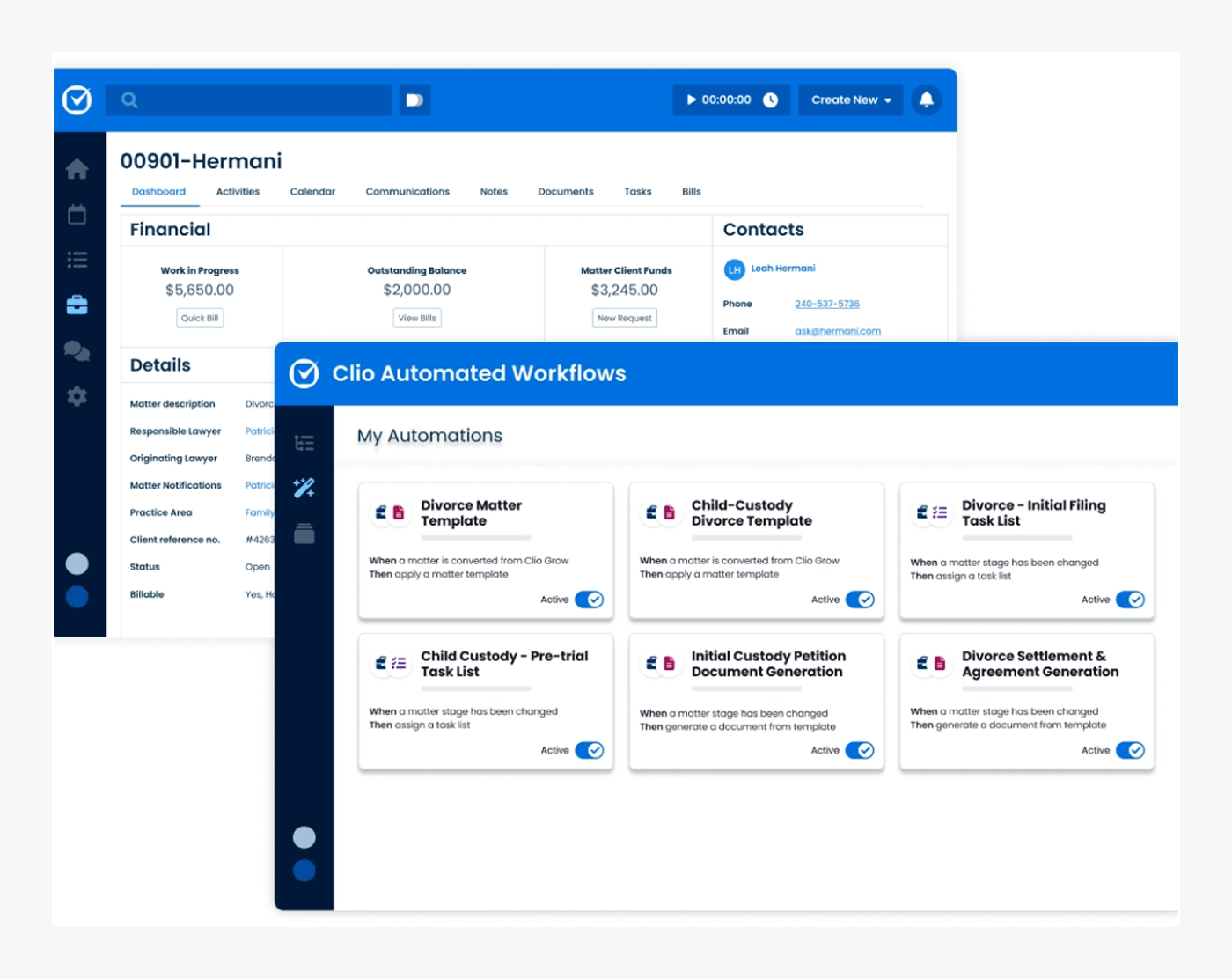
Rating: 4.6/5 ⭐️ (650+ reviews on G2)
Clio is a comprehensive legal practice management platform designed to help law firms of all sizes streamline operations and enhance client communication. With its AI-powered assistant, Clio Duo, the platform automates routine tasks such as client intake and billing to free legal professionals to focus on high-value tasks.
Pros:
- Automated document summaries
- Built-in tools for payments and secure messaging
- Predictive insights and analytics
Cons:
- Issues with integrating with other systems
- Difficult to use and limited onboarding provided
Pricing:
- EasyStart ($59/user/mo)
- Essentials ($99/user/mo)
- Advanced ($139/user/mo)
- Complete ($169/user/mo)
Specializes in: managing cases and automating administrative tasks from a single, cloud-based platform.
Harvey
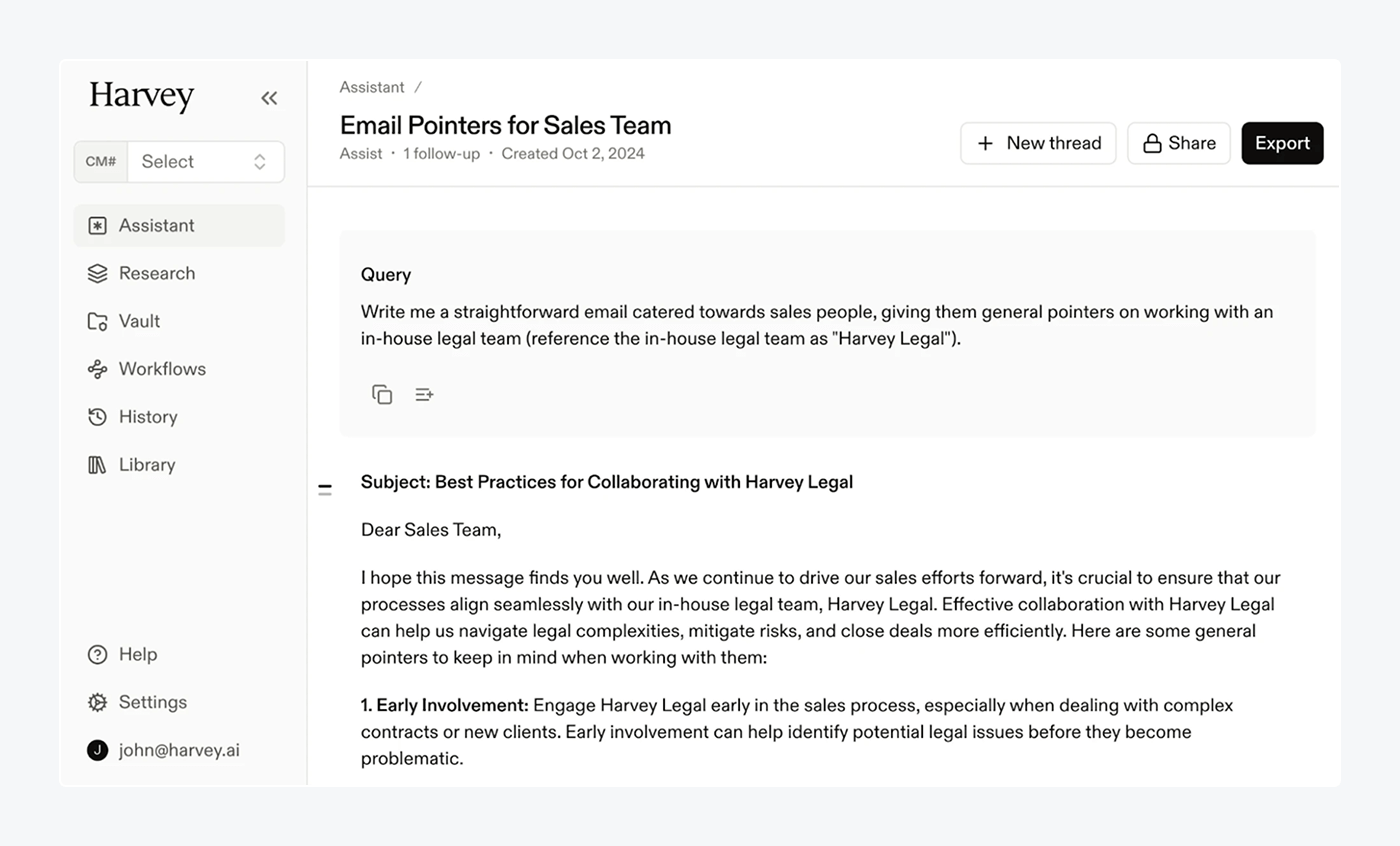
Rating: 4.5/5 ⭐️ (1+ review on G2)
Harvey AI is a generative AI platform designed specifically for the legal industry. It combines natural language processing and machine learning with legal datasets to streamline complex legal workflows. From contract analysis and due diligence to litigation strategy and regulatory compliance, Harvey empowers legal teams to produce high-quality work.
Pros:
- Legal analysis and recommendations
- Document assessments and filtering
- Team collaboration tools
Cons:
- Sometimes it doesn’t pick up detailed nuances in the law
- Limited scope of capabilities
Pricing:
- Pricing available upon request
Specializes in: automating contract analysis, legal research, and due diligence across multiple jurisdictions.
Lexis+ AI
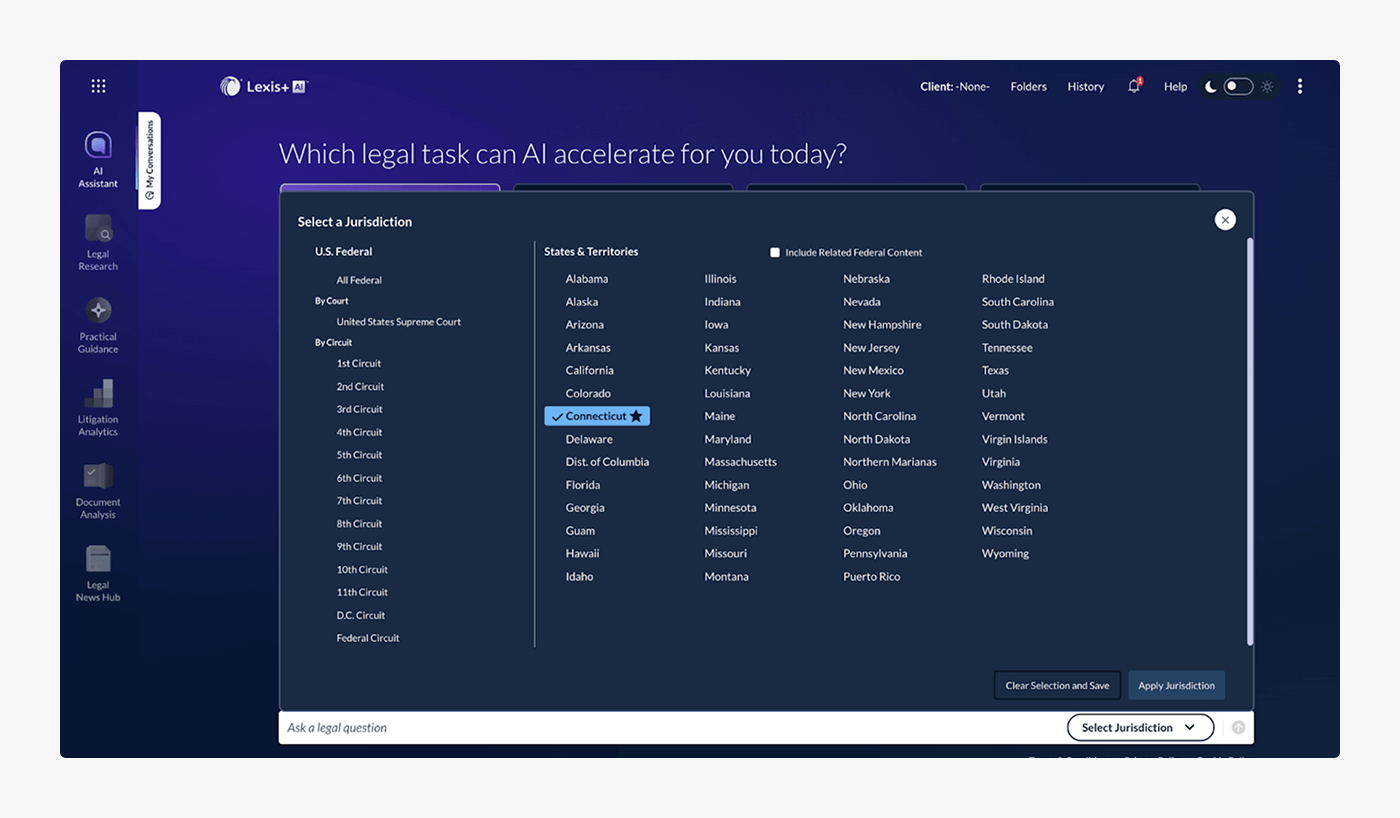
Rating: 4.1/5 ⭐️ (130+ reviews on G2)
Lexis+ AI is an advanced legal research and drafting platform that merges LexisNexis’s industry-leading legal content with generative AI to help legal professionals work smarter. With its intuitive natural language interface and tools for deep analysis, Lexis+ AI helps attorneys to find relevant case law, draft compliant documents, and uncover data-driven insights.
Pros:
- AI-powered brief and document analysis
- Analytics on ruling patterns and jurisdiction-specific nuances
- Strong security and privacy measures
Cons:
- Improvements in password management needed
- Outcomes rarely reach user satisfaction fully
Pricing:
- Essential ($140/mo)
- Enhanced ($387/mo)
- Professional ($627/mo)
- Nexis Essential ($685/mo)
- Select Item ($1,878/mo)
- Nexis Essential with Nexis+ AI ($2,260/mo)
- Lexis+ AI (Pricing on request)
Specializes in: combining generative AI with LexisNexis’s authoritative legal database to help legal professionals with greater strategic insights.
Now, some might wonder—
Can you use ChatGPT as a law AI?
Yes, but we wouldn’t recommend it.
While ChatGPT is a powerful general-purpose AI tool, it’s not recommended for lawyers to rely on it for professional legal work due to several critical limitations.
Most importantly, ChatGPT doesn’t have access to proprietary legal databases or up-to-date case law. This means its responses may lack the accuracy or jurisdictional specificity required in legal practice. Additionally, there are risks related to confidentiality and data privacy, as ChatGPT isn’t designed to meet legal industry compliance standards like HIPAA or SOC 2.
For these reasons, legal professionals are better served using purpose-built legal AI tools that offer vetted data and secure, compliant environments.
Will AI replace lawyers?
In the words of Noah Waisberg and Dr. Alexander Hudek:
“Ultimately, the most valuable attribute of most senior lawyers is their judgment. AI can help senior lawyers make better decisions in less time. Senior lawyers who don’t take advantage of this change put themselves at a real competitive disadvantage.”
AI is not here to replace you, but you should look into using it to improve your efficiency and ultimately increase your revenue.
Automate customer communication for your law firm

